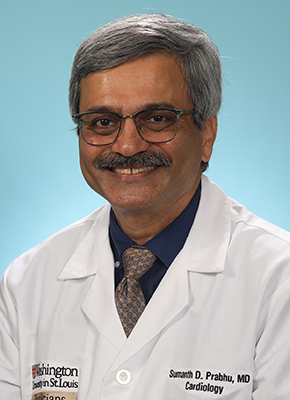
As the Lewin Distinguished Professor and Chief of Cardiology at Washington University School of Medicine in St. Louis, I welcome you to the Division of Cardiology. Founded in 1947, the Division has built an exceptional foundation for academic cardiology, encompassing clinical care, cardiovascular research, and comprehensive training that we believe position us as one of the elite cardiology programs in the country.
Our tripartite mission is driven along a trajectory of excellence by nearly 90 faculty and 40 fellows whose work encompasses a broad range of cardiology subspecialties and innovative cardiovascular research. Our clinical program is consistently among the top 50 cardiology and heart surgery programs in the US News and World Report national rankings every year. Our faculty are among the national and international leaders in the field, and we pride ourselves on producing outstanding scholarship and training future leaders in cardiology.
We maintain the highest level of excellence in clinical care in our outpatient clinics at the Center for Advanced Medicine and Heart Care Institute that provide nearly 50,000 patient visits annually, and in collaborative partnership with Barnes-Jewish Hospital, a 1,273-bed facility, the BJC health care network, St. Louis Children’s Hospital, and the St. Louis VA Medical Center. Cutting-edge diagnostics and therapeutics are offered across the field of cardiology, including general and consultative cardiology, preventive cardiology, critical care cardiology, interventional and structural cardiology, cardiac electrophysiology, heart failure and transplant cardiology, cardiomyopathies, cardio-oncology, adult congenital heart disease, echocardiography and cardiac imaging, sports cardiology, cardiac rehabilitation, aortic disease, cardio-obstetrics, and global cardiovascular health.
We are extremely proud of our high-quality cardiovascular fellowship training programs. We have 40 plus cardiology fellows pursuing ACGME-accredited training either in general cardiology or subspecialty fellowships in heart failure and transplantation, interventional and structural cardiology, clinical cardiac electrophysiology, and adult congenital heart disease. We also offer a variety of additional advanced training in cardiac imaging, cardio-oncology and amyloidosis, aortic disease, and cardiovascular research. The Division has had a long-standing T32 training grant entitled Principles in Cardiovascular Research, which has trained a large number of physician-scientists over nearly 50 years. We strive to offer exceptional continuing medical education programs.
The Division has contributed extensively to cardiovascular discovery in many areas including thrombolytics in acute myocardial infarction, biomarkers of cardiac injury, cardiac imaging, radio-ablation of cardiac arrhythmias, cardiac metabolism, and cardio-immunology. We currently attract more than $9 million in external grant funding from the NIH, VA, and AHA and other foundation grants, and our divisional research is anchored by center infrastructure provided by the Center for Cardiovascular Research, the Consortium for Translational Research in Advanced Imaging, the Center for Health Economics and Policy, and the Global Health Center. Our faculty are robustly represented in the American Heart Association, American College of Cardiology, Heart Failure Society of America, Heart Rhythm Society, American Society of Echocardiography, the National Marfan Foundation, the Association of University Cardiologists, the American Society for Clinical Investigation, and the American Association of Physicians. Members of our faculty have contributed to many national clinical practice and research guidelines, and regularly present at national and international meetings. The Division has representation on the editorial leadership (Editor or Associate Editor) of Circulation Research, Circulation: Heart Failure, Circulation: Cardiovascular Imaging, and JACC: Basic to Translational Science. Our research programs extend across basic and clinical science and encompassing fundamental discovery and translational research clinical trials, clinical outcomes, implementation science, and health care economics and policy research. The excellence and experience of our faculty as leaders in cardiovascular medicine, training, and investigation, and our rich clinical, educational and research resources provide an outstanding base for the advancement of cardiovascular medicine. I invite you to learn more about the Division through this website.